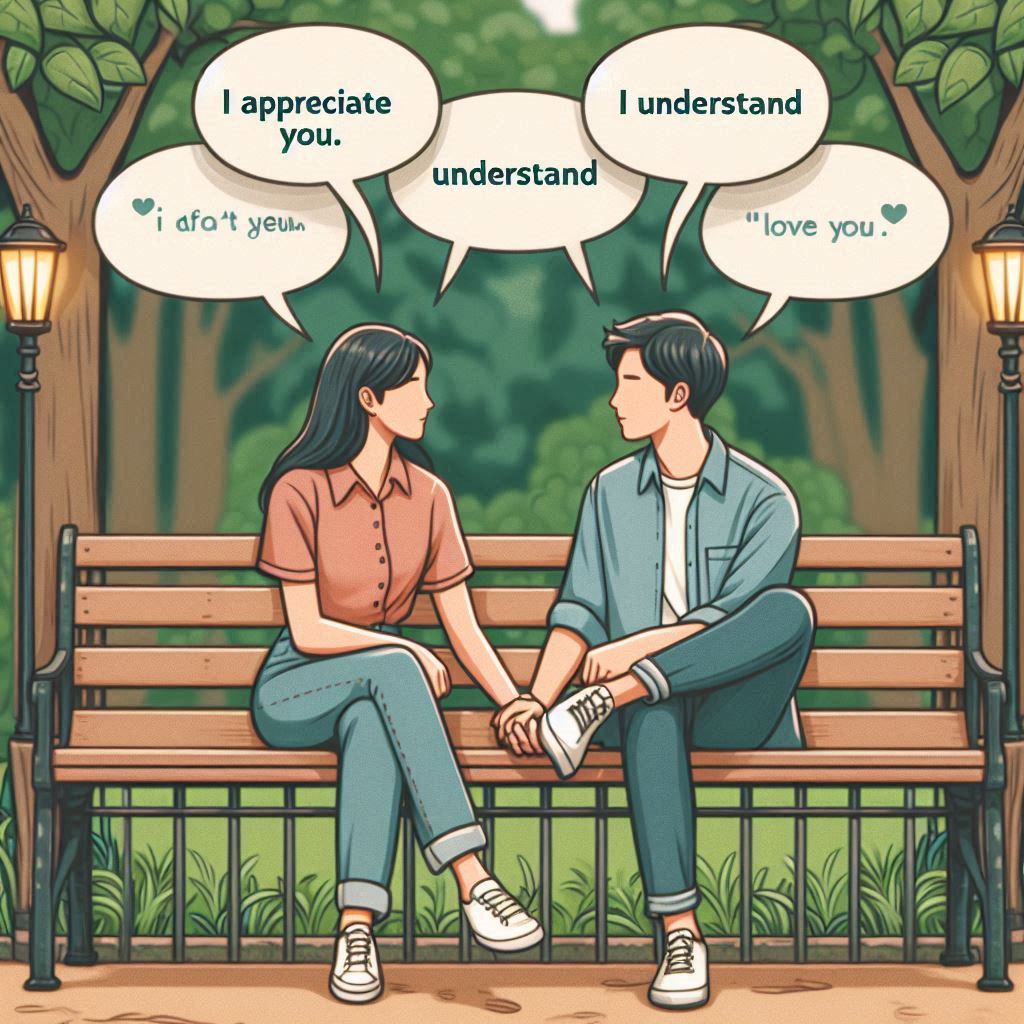
Good communication is almost like the secret sauce to any healthy relationship. It isn’t just about talking; it’s about truly connecting. Clear and effective communication can make bonds stronger, ensure misunderstandings are cleared up quickly, and help partners understand each other on a deeper level.
Active listening is at the heart of good communication. This means actually paying attention when your partner speaks, not just waiting for your turn to talk. Nodding, making eye contact, and even echoing back what your partner says can show you’re fully engaged and value their words.
Empathy and understanding are superpowers in communication. When you put yourself in your partner’s shoes, it allows you to see things from their perspective. This doesn’t mean you always have to agree, but it does mean you’re making an effort to understand their feelings and viewpoints. Empathizing can reduce friction and foster deeper connection.
Openness and honesty are non-negotiable. You can’t expect your partner to read your mind. Saying what you feel and think clearly and respectfully is crucial. This doesn’t mean blurting out whatever comes to mind without considering how it will affect your partner, but it means being truthful about your feelings and needs.
Non-verbal communication plays a huge role too. Sometimes, your body language speaks louder than words. Things like a hug, a touch on the arm, or simply how you look at your partner can convey care and reassurance. It’s not just what you say, but also how you say it, that counts. So, be mindful of these non-verbal cues as they often carry significant weight in your interactions.
Identifying and Addressing Poor Communication Habits
Spotting the red flags of poor communication is crucial. Common signs include frequent misunderstandings, feeling unheard, or constant arguments. These can indicate that something’s amiss in how you and your partner talk to each other.
Bad communication can seriously impact your relationship. It can lead to resentment, emotional distance, and even a complete breakdown of trust. Knowing how damaging this can be highlights the importance of addressing it head-on.
Reasons behind communication breakdowns vary. Sometimes, it’s stress from work or personal issues that makes you snap at each other. Other times, it’s simply that you’ve developed poor communication habits over time. Recognizing these reasons is the first step toward improvement.
Identifying communication gaps is essential. Try to pinpoint specific issues, like if your arguments always revolve around the same topics or occur during certain times. Understanding these patterns can help you address root problems rather than just symptoms.
Steps to improve and rebuild communication involve being proactive. Start by setting aside dedicated time to talk without distractions. Practice being patient and giving each other the benefit of the doubt. Use tools like ‘active listening’ and ‘I’ statements to express thoughts without placing blame. Sometimes seeking outside help from a professional can also offer new perspectives and strategies for better communication.
Practical Tips for Enhancing Communication with Your Partner
Regular and meaningful conversation is key. Make it a habit to check in with each other daily, even if it’s just a quick chat about how your day went. These daily exchanges keep you connected and updated on each other’s lives.
Effective listening techniques can transform your interactions. Show you’re engaged by nodding, maintaining eye contact, and occasionally summarizing what your partner says. This not only shows you’re paying attention, but also helps avoid misunderstandings.
Using ‘I’ statements to express feelings can prevent defensive reactions. Instead of saying, ‘You never listen to me,’ try, ‘I feel unheard when…’. This way, you’re focusing on your feelings rather than accusing your partner.
Creating a safe space for open dialogue is crucial. Make sure your partner feels comfortable sharing their thoughts and feelings without fear of judgment or backlash. This means being patient, non-critical, and showing empathy, even during disagreements.
Building and maintaining trust through consistent communication lays the foundation for a stronger relationship. Regularly expressing appreciation and acknowledging each other’s efforts go a long way. Trust isn’t built overnight; it’s an ongoing process of being reliable and supportive.
Understanding the Root Causes of Communication Issues
Common causes of lack of communication often stem from everyday stresses and busy schedules. When life gets hectic, it’s easy to neglect meaningful conversations, leading to feelings of disconnect.
Stress and external pressures play a significant role. Work stress, financial worries, or family issues can all take a toll on how we communicate. When preoccupied with these external pressures, it’s challenging to be fully present in conversations with your partner.
Conflicting communication styles can create barriers. Maybe one of you prefers direct and straightforward talk, while the other favors a more indirect and subtle approach. Understanding these differences is essential to bridge the communication gap.
Emotional intelligence is also important. Being aware of and managing your own emotions, while understanding your partner’s, can improve interactions. High emotional intelligence helps in recognizing and addressing issues before they blow up.
Sometimes, professional help is the way to go. Couples therapy or counseling can offer new perspectives and tools for better communication. It’s not about admitting defeat but investing in the health and longevity of your relationship.
Sustaining Healthy Communication Long-Term
Developing healthy communication habits is like tending to a garden. It requires ongoing effort and attention. Make it a point to continuously practice the good communication habits you’ve established.
Ongoing effort and practice are key. Even when things seem smooth, don’t get complacent. Keep working on your communication skills. This persistence helps prevent old habits from sneaking back in.
Mutual respect and understanding form the bedrock of any lasting relationship. Always approach conversations with respect, even when it’s challenging. This sets a positive tone and reinforces your bond.
Using communication to strengthen your relationship means actively celebrating the good times and supporting each other through the tough times. Share your joys, voice your concerns, and always be your partner’s biggest cheerleader.
Growth and adaptability in communication are crucial. As life changes, so will your communication needs. Be willing to adapt and evolve in how you connect with your partner. This flexibility will help you navigate any new challenges together.

Support Us by Shopping Through Our Links!
At love-intimacy.com, transparency is important to me. To comply with FTC guidelines, I want you to know that some of the links on this site are affiliate links. This means I may earn a small commission if you make a purchase through these links—at no extra cost to you.

You did a fantastic job of outlining the key elements that make for effective and healthy communication between partners. I particularly appreciated how you emphasized the importance of active listening and expressing feelings clearly—it’s such a crucial aspect that often gets overlooked.
I’m curious, do you think there are any specific communication techniques that work better for couples who are just starting out in their relationship versus those who have been together for a long time? Also, how do you suggest handling situations where one partner is less open to discussing their feelings? Your insights were really helpful, and I’m excited to try some of these tips in my own relationship!
The pleasure is mine! I’m thrilled to hear that you found the post helpful and that you’re excited to apply the tips to your own relationship.
Regarding your questions, I believe that while some communication techniques are universally effective, others may be more suitable for couples at different stages of their relationship. For instance, couples who are just starting out may benefit from techniques like “ask open-ended questions” and “share your feelings using ‘I’ statements,” which can help them get to know each other better and establish a strong emotional connection. On the other hand, couples who have been together for a long time may find techniques like “schedule regular check-ins” and “practice empathy” more helpful in maintaining their connection and navigating potential conflicts.
As for handling situations where one partner is less open to discussing their feelings, I suggest approaching the situation with empathy and understanding. It’s essential to create a safe and non-judgmental space where both partners feel comfortable sharing their thoughts and emotions. You can start by expressing your own feelings and thoughts, using “I” statements, and then gently encouraging your partner to do the same. It’s also crucial to listen actively and avoid being confrontational or accusatory, as this can lead to further closure. Remember, effective communication is a two-way street, and it may take time and effort to find the right balance.
Thank you again for your thoughtful comment, and I wish you all the best in your relationship.
Feel at home here !
This is a great post, Cyril! I appreciate how you highlight the importance of both verbal and non-verbal communication in relationships. It’s so true that effective communication goes beyond just talking—it’s about really connecting on a deeper level with empathy, active listening, and openness. I especially liked your tips on using ‘I’ statements and creating a safe space for dialogue; they’re practical and actionable steps that anyone can implement.
I’m curious—what advice would you give to someone who feels their partner isn’t as open to improving communication? How can they encourage their partner to engage in this process without causing defensiveness?
– Scott
Thank you, Scott! I’m glad you found the post helpful and resonated with the importance of both verbal and non-verbal communication in relationships.
Regarding your question, I understand that it can be challenging when one partner is less open to improving communication. Here’s a possible solution:
Instead of directly telling your partner that they need to improve their communication skills, try having an open and honest conversation about your own feelings and needs. Use “I” statements to express how you feel when you don’t feel heard or understood, and avoid blaming or accusing language. For example, “I feel disconnected when we don’t talk about our feelings. Can we find a way to share our thoughts and emotions more openly?”
It’s also essential to create a safe and non-judgmental space for dialogue, as I mentioned in the post. This can involve setting aside dedicated time to talk, free from distractions, and actively listening to each other without interrupting or becoming defensive.
To encourage your partner to engage in this process, you could suggest seeking the help of a couples therapist or counselor who can provide a neutral and supportive environment for both of you to work on your communication skills.
What are your thoughts on this approach, Scott? Have you experienced similar challenges in your relationships, and how have you addressed them? I’m here to listen and continue the discussion!
Having great communication skills is so important in a relationship because having great communication skills and being a good listener can positively impact a relationship. Even if a person doesn’t have these skills they can always learn. It may take some time but it is possible. Thanks so much for sharing that can help so many people.
Thank you for your kind words and insightful comment! You’re absolutely right, having great communication skills and being a good listener can make a huge difference in a relationship. And I love your emphasis on the fact that these skills can be learned – it’s never too late to work on improving our communication style and becoming a better partner. It’s all about being open to growth, willing to put in the effort, and being patient with ourselves and each other. I’m glad you found the post helpful, and I hope it can inspire others to prioritize communication in their relationships too!
Hi there,
Thanks for sharing,I believe that focusing on effective communication skills in relationships is key to building strong connections. It’s like adding that special ingredient that makes everything come together smoothly. It’s awesome that you’re diving into the realm of relationship communication skills! Communication truly is the secret sauce for nurturing healthy relationships. Active listening, empathy, openness, and non-verbal cues all play significant roles in fostering strong connections. Understanding these aspects can help you navigate through potential communication challenges and strengthen your bond with your partner. Keep exploring and honing these skills to enhance your relationships.
Thank you so much for your thoughtful comment! I completely agree that effective communication is the foundation of strong, healthy relationships. It’s amazing how often misunderstandings and conflicts can arise from simple miscommunications, and yet, it’s incredible how much stronger relationships can become when both partners prioritize active listening, empathy, and open communication. I love your phrase ‘secret sauce’ – it’s such a great way to describe the transformative power of effective communication in relationships. I’m glad to be on this journey of exploring and honing these skills, and I appreciate your encouragement and support!